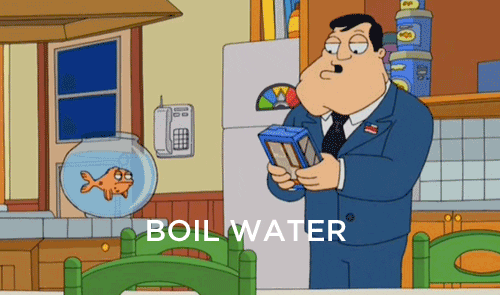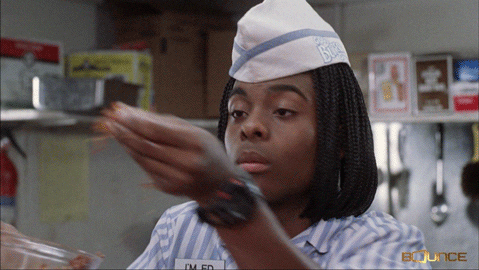Hey Broiler Roomies- Broiler Heads? Broiler Gang? Eh, we’ll work on that. Thanks for joining us after another week in the salt mines. As we’re sure you’ve noticed, everything costs a bazillion dollars right now. We’re running out of vegetable oils, baby formula, and the heat wave in India is sending a huge blow to the global food supply already badly damaged by the war in the Ukraine. That’s all to say, your grocery dollars are having to stretch further than ever before. So this week we’re keeping it simple and showing y’all some of the common mistakes people make in the kitchen that can quickly fuck up a meal, regardless of the recipe. There’s no room in the budget for back up dinners and you don’t wanna be muscling down fucked up food, k? These routine mistakes are easily fixed so pay attention and dinner is gonna turn out great without a single wasted bite.
1. Not bringing the water to a boil
We’ve all been there. You’re fucking hungry and throwing together a quick pasta for dinner but damn if that pot of water isn’t taking forever to boil. Impatiently, you throw the salt and pasta in as soon as you see a bubble. The resulting pasta is gummy, gross, and somehow took forever to cook. Stop. This. Shit. When you throw a room temperature item like pasta into a pot of water, you bring down the temperature of the water and it takes a while to warm back up. If you wait until the water is truly boiling, this temperature drop off isn’t such a hit because the water in the pot was hot as hell to begin with. Makes sense, right?
This same idea is why lots of recipes have you add stuff to sauté pans in stages. If you added all the veggies at once, the oil in the pan would cool way down and take forever to warm back up. So basically, let that water climb all the way to a boil and keep in mind temperature fluctuations when you’re adding shit in a hot pot or pan. Easy.
2. Using too small of a pan
When you’re sautéing or pan-frying ingredients, you want as much of the food to be touching the hot surface of the pan as possible. Everyone should know this. But still, so many people use too small of a pan when they’re cooking. Please, just reach for the larger pan. If your ingredients are piled a few inches high in the pan, only the bottom-most layer is sautéing. The rest of the pan is actually kinda steaming from the heat and water loss of the bottom layer. They’re getting sloppy seconds when it comes to heat and you aren’t gonna be happy with the results. Just grab a bigger pan and your ingredients will cook waaaaay better and the results will be much more satisfying. Plus it’s not any extra work. In short, don’t crowd your pan.
3. Adding oil to a cold pan
This is another lesson in patience. Lots of us drizzle oil into our pans then turn on the heat; it feels like the fastest way to do things. But you’re setting yourself up for lots of shit sticking to your pan because you are bypassing the Leidenfrost effect. This is a fancy name for a phenomenon you’re probably familiar with. The Leidenfrost effect is when a liquid, close to a surface that is significantly hotter than the liquid's boiling point- like a pan- produces an insulating vapor layer that keeps the liquid from boiling rapidly. This effect repeals the droplet, allowing it to hover over the surface, rather than making physical contact with it. You’ve seen this when you’ve splashed a drop or two of water on a greased-up griddle before you made pancakes. The water drops kinda race across the surface of the pan letting you know that it's warm enough for the batter. This is exactly the environment you want to create for everything you cook in oil. Not only will this help keep your ingredients from sticking to the pan, but you’ll also use less oil and cook your food more evenly. So warm up your pan until you can feel some heat when you hover your hand over the surface from an inch or two, then add your oil, and wait until you can make a droplet dance. Easy and your resulting dish will be a lot better because of it.
4. Adding your dried herbs and spices too late in a recipe
If you’ve been cooking along with us for a while, you might have noticed that most of our recipes call for adding a good portion of the spices early with the oil and/or base veggies. This isn’t by accident. This is called blooming or tempering your spices and it helps you get so much more fucking flavor from your seasoning. This technique is common in South Asian and Indian cooking where the use of spices is basically unmatched so you know this shit works. If you could get up to 10 times the flavor from the same portion of spices, why wouldn’t you? When you add spices to the warm oil fat-soluble flavor compounds are released from spices like red pepper flakes, cumin, and thyme that would go underutilized if you just stirred them in with whatever liquid you add to the pot. And as a bonus, when you add spices to the warm cooking oil they will be able to better season the overall dish since they are more evenly distributed in every bite. It’s seriously a win-win and an easy enough change to recipes that don’t call for it. Just throw some of the dried spices in the warmed up oil first or towards the end of sauteing the veggies in oil. You can do it. We have faith.
This week in our Sunday recipe club edition of The Broiler Room, we’re dropping a cookie recipe fit for your best four-legged friend. Not a member? Fix that shit.
Thanks again for joining us here in our silly little corner of the internet. See you next week, k?
Michelle and Matt








You're kind of asking for this with the "what am I a chemist" meme 🤣
1) "your water was already 20 degrees above boiling" => impossible. Water can't be above boiling, only steam can. What happens is that bubbles start appearing way before water actually reaches the boiling temperature. It's not boiling unless it reached a rapid boil. Just put the lid on the pot to speed up the process, it makes a huge difference and prevents you from staring at it. Also add salt when it's getting hot, it helps to start the boil kinetically.
2) leidenfrost is a cool effect but I don't think it's the right explanation. Olive oil boils at above 500 temperatures. Please don't heat your pans to 550 degrees and then pour oil in it, your pan will thank you and so will the fire department.
I had no idea about adding oil to a hot pan. Thank you!